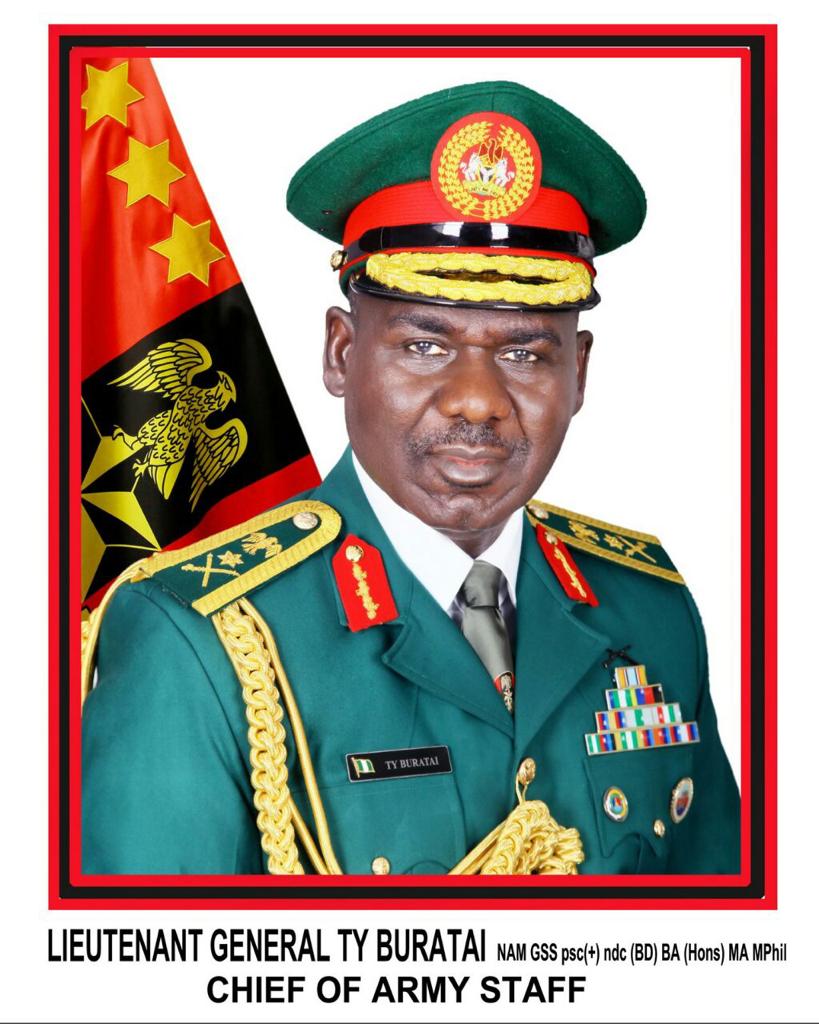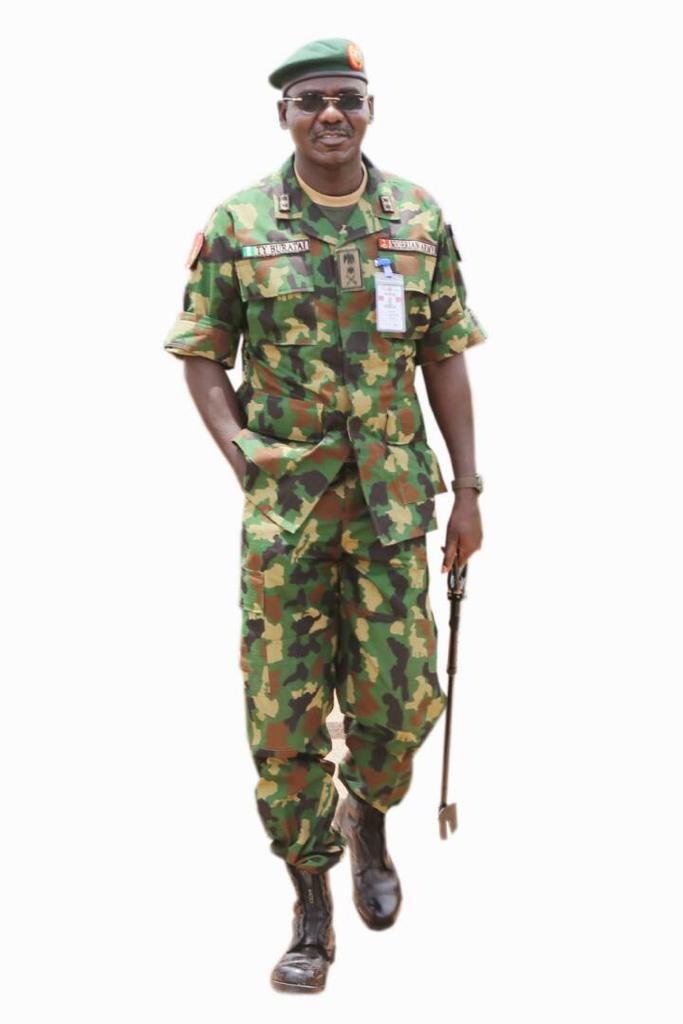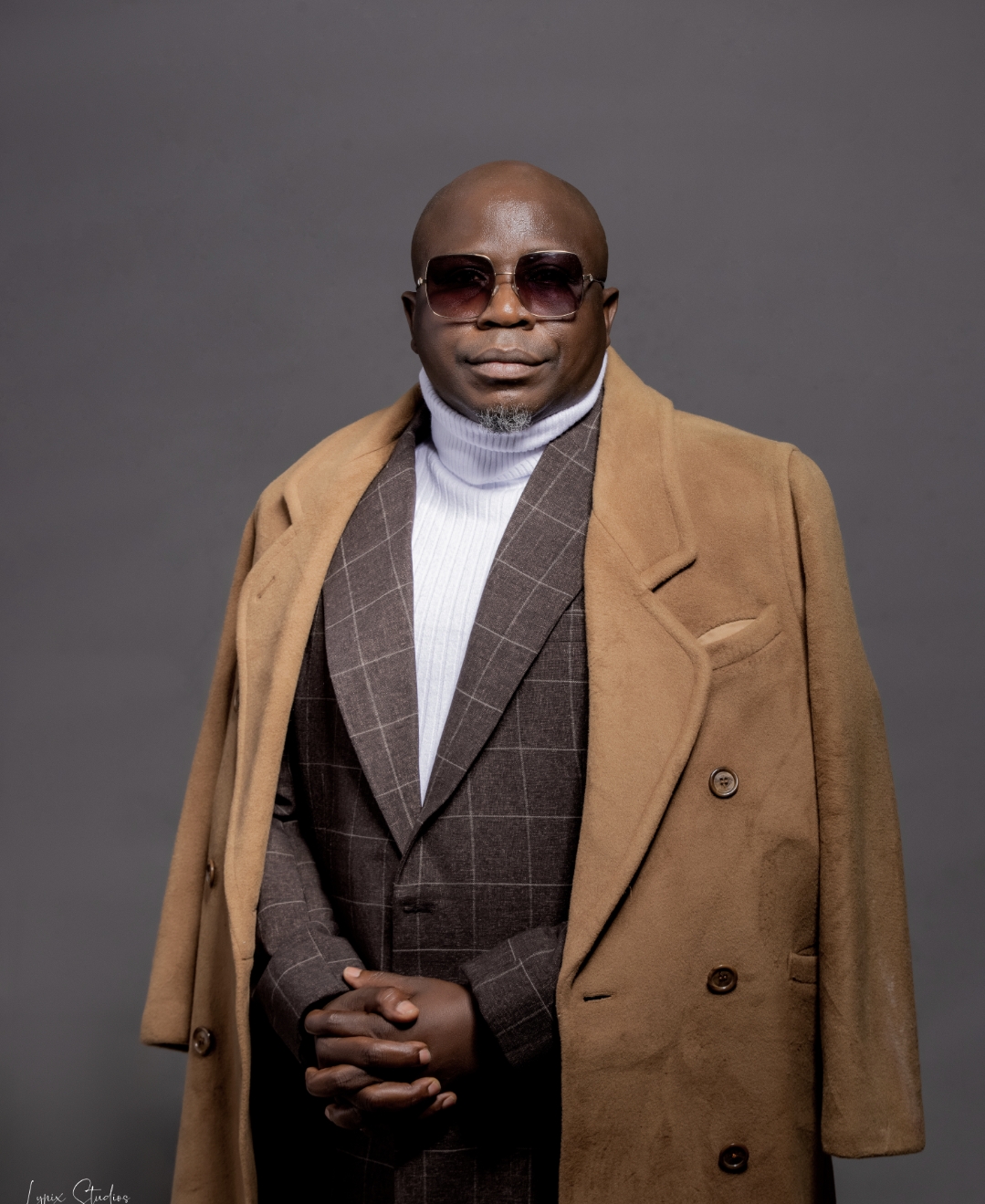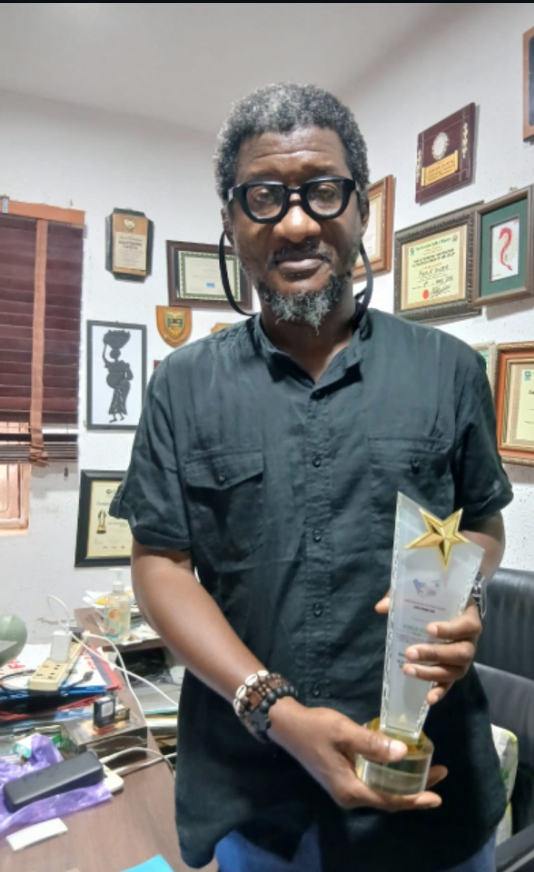celebrity radar - gossips
Why History will Continue To remember General Ambassador (Dr) Buratai As immediate past Chief of Army Staff

The vision and leadership style of the immediate past Chief of Army Staff, Nigerian Army, Lieutenant General Tukur Yusufu Buratai (retired), is a case study when we think of military leadership and strategy in modern times. It is the focussed vision and leadership style that stood him even among his contemporaries as he motivated troops and accomplished so much. It would be understating the fact to state that Nigerian troops never recorded more significant successes against Boko Haram than they did under the immediate past Chief of Army Staff’s tenure. It is on record that he put in tremendous efforts to ensure his troops were motivated with different welfare packages initiated by him for their comfort.

Prior to his appointment as the Chief of Army Staff by President Muhammadu Buhari, the military was losing its officers and men in large numbers. Thus, Buratai’s focus was to improve on the military’s operational achievements. He made a success of it and the result was the unprecedented successes in the counterinsurgency operation he is being credited for even after he exited office.

Within three months of his appointment, Buratai demonstrated his leadership capability by showing that he indeed understood the terrain of the North East, the epicenter of the insurgency. He took the war to Boko Haram and his soldiers recaptured and hoisted the Nigerian flag in Gamboru Ngala, which served as Boko Haram’s main operational base. The insurgents were chased to their Sambisa Forest hideout where troops of the Operation Lafia Dole proudly displayed vital insignias of the sect including a Holy Quran and flags of the sect’s leader, Abubakar Shekau, on national television to the admiration of Nigerians.
Improving the welfare of the army was vital in his agenda. His major policy therefore was directly for the benefit of the troops. He ensured that they were in right frame of mind in their duty. Buratai would go to any length to see and meet the troops’ needs at every point in time. Under his leadership, priority was given to the equipment used by the military to combat the insurgents, among other steps taking by him. The allowances and bonuses of the military were paid as at when due.
His concentration was centered on identifying the most pressing problems that troops and their families were facing, the needs associated with those challenges, and he utilized the resources available to meet those needs. It was also to his credit that the fighting troops were provided with constant water supply to meet their daily needs and to stabilize them emotionally and psychologically. As part of efforts to encourage his men, General Buratai on Tuesday July 25, 2017 approved the promotion of 6,199 soldiers involved in the fight against Boko Haram under his watch.
In the basic responsibilities of a leader which include accomplishment of the mission and the welfare of the soldiers, Buratai was not found wanting. He established Nigerian Army Farms and Ranches, built and commissioned block of flats at Jaji, Khobe Cantonment, Jos in Plateau State and the Danjuma Chalets at 2 Division Headquarters. The former Army chief also renovated a lot of projects he met on ground and initiated water projects including the Supply and Transport Foods and new Command Guest Houses.
Buratai’s contributions to national, regional and international peace have not gone unnoticed here at home and abroad, which, obviously, led to his being appointed a non-career ambassador after a successful military career.
In terms of projects, capacity building, training and welfare, throughout Buratai’s tenure as COAS, there was never a dull moment.
It is on record that Buratai’s leadership style did inspire the fighting soldiers, a record-breaking template his successors would also find suitable to utilize. When he became the Nigerian army chief, he made it a duty to identify with his officers and men as they launched a full-scale war against the Boko Haram fighters.
He initiated a range of activities in support of developing the force, via intensive training, mentoring, partnering, monitoring and empowering. His enabling efforts in that regards include setting up the Nigerian Army Institute of Technology and Environmental Studies in Biu, Borno State; Command Secondary School (Boys & Girls) in Kebbi State; Nigerian Army Aviation hangar at Jaji Airstrip, Kaduna; Mine Resistance Amour Protected (MRAP); Activation of Divisions Training Schools; establishing Tinapa Post Housing Development Limited Estate, Calabar; Army Warrant Officers Board; the Nigerian Army Special Forces School; First Nigerian Army indigenous infantry patrol vehicle; Nigerian Army Cyber Warfare Command and the Nigerian Army Vehicle Manufacturing Company.
Other capacity building projects Buratai initiated are; the Supply and Transport Driving School; Nigerian Army Women’s Corps; Nigerian Army Officers’ Wives Association Hospital; Unmanned Aerial Vehicle Command; 20 Regimentation Battalion; 133 Special Forces Battalion; 123 Special Forces Battalion; Counter Terrorist and Counter Insurgency Museum; 109 Special Forces Battalion; 4 Special Forces Battalion, Counter Explosive Devices; 707 Special Forces Brigade; Motorcycle Battalion; Nigerian Army Agricultural Business Enterprise Limited; Army War College, Nigeria; Nigerian Army Bureau De Change; Nigerian Army Investments Account; Operation Lafia Dole Sectors 1,2 and 3; Homes Fit for Heroes; Otukpo Post Housing Development Limited Estate; Buffalo Engineering and Technical Services Limited, evolution of new operational concepts, establishment of 6 and 8 Divisions, Nigerian Languages Training Initiative, and many more.
Inspiring and effectively leading subordinates, especially through a military mission with life or death implications, is no small feat. It requires leadership, one that extends well beyond the battlefield.
Evidently, for years to come, history will remember General Yusuf Buratai, particularly, in areas critically important to Nigerian Army.
celebrity radar - gossips
Laffmattazz with Gbenga Adeyinka & Friends Returns In 2026, As Canada Joins Tour

Laffmattazz with Gbenga Adeyinka & Friends Returns In 2026, As Canada Joins Tour
Nigeria’s longest-running and most consistent comedy tour, LaffMattazz with Gbenga Adeyinka & Friends, has officially announced its 2026 tour themed “Next Chapter.” The upcoming edition marks a major milestone as the brand celebrates its 15th edition with a bold expansion that includes Canada for the first time.
The Next Chapter edition represents a clear evolution from previous years — signaling growth, global reach, and a renewed creative vision. While past editions focused on taking premium comedy experiences across Nigerian cities, the 2026 tour elevates the brand with international exposure, upgraded production, and stronger engagement with audiences at home and in the diaspora.
Speaking on the significance of the new theme, organizers describe the 15th edition as more than a celebration of longevity, but a statement of intent — positioning LaffMattazz as a global Nigerian entertainment export.
CONFIRMED TOUR CITIES & VENUES
•Ibadan – Jogor Center (Easter Sunday, April 5th, 2026)
•Akure – The Dome International Culture & Event Center
•Abeokuta – OOPL Marquee
•Lagos – Balmoral Convention Center
•Canada – Multi-city tour (dates to be announced)
Audiences can expect a rich blend of comedy, music, and surprise guest appearances — delivered with the signature “& Friends” experience that has defined the tour for over a decade.
With the Next Chapter, LaffMattazz reinforces its legacy while opening new doors for African comedy on the global stage.
celebrity radar - gossips
Kevin David Kaydee Releases Inspiring Single “Oluwa Settle Me”

Kevin David Kaydee Releases Inspiring Single “Oluwa Settle Me”
Rising music artist Kevin David Kaydee has released a powerful new single titled Oluwa Settle Me, a soulful Afro-inspired anthem that blends heartfelt prayer with modern rhythm.
“Oluwa Settle Me” captures the everyday cry of many believers seeking breakthrough, peace, and divine favour. With emotionally rich melodies and uplifting instrumentation, the song expresses a sincere plea to God for complete answers to life’s pressing questions—career, destiny, relationships, and spiritual fulfilment.

Drawing from Afrocentric sounds and contemporary gospel influences, the track stands out for its simplicity, sincerity, and spiritual depth. Kevin David Kaydee delivers the message with passion, creating a worshipful atmosphere that resonates across age groups and cultures.
The song’s message of hope and dependence on God positions it as more than just music,it is a prayer set to melody. By fusing spirituality with modern lifestyle rhythms, “Oluwa Settle Me” reflects the growing wave of gospel music that speaks directly to real-life struggles while pointing listeners back to faith.
As gospel music continues to evolve across Africa and beyond, Kevin David Kaydee’s latest release reinforces music as a powerful tool for encouragement, reflection, and spiritual connection.
“Oluwa Settle Me” is now gaining attention among gospel music lovers for its relatable message and soulful sound, marking another significant step in the artist’s growing musical journey.
celebrity radar - gossips
Another Feather for Nollywood Icon Fidelis Duker

**Another Feather for Nollywood Icon Fidelis Duker
*Lagos, Nigeria* — In a remarkable celebration of artistic achievement, renowned Nollywood figure Fidelis Duker received yet another prestigious accolade last weekend, solidifying his role as a key player in the growth of the Nigerian and African film industries. The award was presented in a ceremony held at Duker’s Lagos office by esteemed film and theatre director, Mr. Alex Eyengho, founder of the Warri International Film Festival, alongside Marketing and Strategy Director, Mrs. Matel Eyengho.
The recent recognition builds upon Duker’s previous achievement at last year’s ECOFEST in Dakar, where he was honored with a Lifetime Achievement Award. This latest accolade is a testament to his unwavering dedication and substantial contributions to the cinematic landscape.
“I am truly humbled by this recognition,” Duker expressed during the event. In his speech, Alex Eyengho lauded Duker’s pioneering efforts in establishing significant film festivals in Nigeria, particularly the Abuja International Film Festival, which has played a vital role in promoting local talent and storytelling.
Eyengho emphasized, “Fidelis has not only paved the way for emerging filmmakers but has also helped elevate Nigerian cinema on the global stage. His creative vision and commitment inspire all of us in the industry.”
As Duker reflects on this honor, he acknowledges the importance of teamwork and collaboration in achieving success. “This acknowledgment reaffirms to my team and me that our work is being observed, and it motivates us to continue contributing to the development of our sector,” he stated.
With numerous projects on the horizon, Duker remains a relentless advocate for the growth and recognition of African cinema. His latest recognition is yet another testament to the vibrant and evolving landscape of Nollywood, as industry leaders like him continue to inspire future generations.
As the film industry anticipates the next phase of development, Duker’s continued influence signals a promising future for filmmakers in Nigeria and across the continent.
-

 celebrity radar - gossips6 months ago
celebrity radar - gossips6 months agoWhy Babangida’s Hilltop Home Became Nigeria’s Political “Mecca”
-

 society5 months ago
society5 months agoReligion: Africa’s Oldest Weapon of Enslavement and the Forgotten Truth
-

 society6 months ago
society6 months agoPower is a Loan, Not a Possession: The Sacred Duty of Planting People
-

 news6 months ago
news6 months agoTHE APPOINTMENT OF WASIU AYINDE BY THE FEDERAL GOVERNMENT AS AN AMBASSADOR SOUNDS EMBARRASSING








